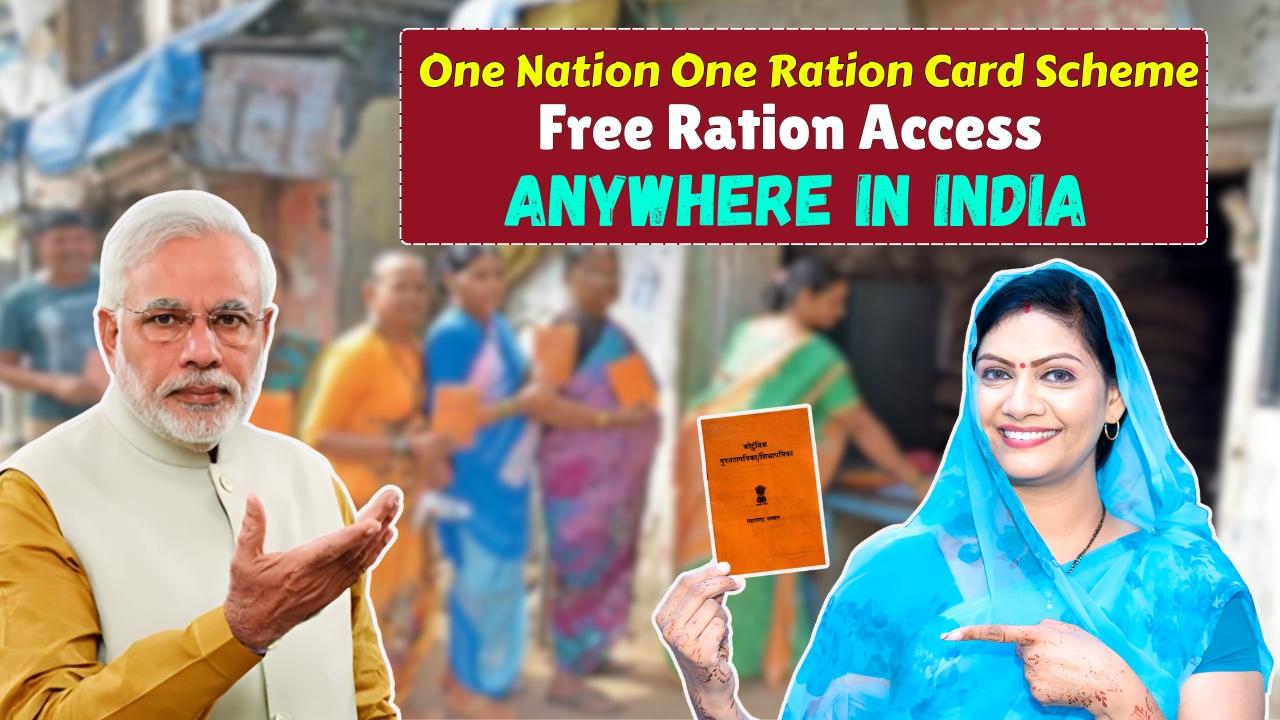The Government of India’s “One Nation One Ration Card” (ONORC) scheme has revolutionized the country’s public distribution system by ensuring that beneficiaries can access their entitled food grains from anywhere in India. This initiative reflects India’s commitment to building an inclusive and transparent welfare system where every citizen, regardless of their location, can enjoy their basic right to food security.
Introduction to the Scheme
The One Nation One Ration Card scheme was launched to bring uniformity and convenience to the Public Distribution System (PDS). Traditionally, ration cards were linked to specific fair price shops within a person’s home state or district, making it difficult for migrant workers and families who relocated for employment. With the ONORC system, beneficiaries can now claim their ration from any PDS shop across the country, ensuring true portability of food entitlements.
This scheme is especially beneficial for millions of migrant laborers, seasonal workers, and their families who frequently move between states in search of livelihood opportunities.
Objective of the One Nation One Ration Card Scheme
The main objective of ONORC is to ensure that every individual eligible for subsidized food grains under the National Food Security Act (NFSA) can access their entitlements seamlessly, irrespective of geographical boundaries. The initiative aims to create a unified, technology-driven network that connects all ration cards, beneficiaries, and fair price shops under one system.
The scheme also strives to reduce corruption and duplication in the PDS by linking ration cards to Aadhaar, thereby promoting transparency and accountability.
Key Features of the Scheme
The ONORC scheme is built on several key features that make it one of the most impactful welfare programs in recent years:
- National Portability: Beneficiaries can avail of their ration quota from any PDS shop in any part of India.
- Aadhaar Integration: Ration cards are linked with Aadhaar to authenticate beneficiaries and prevent misuse or duplication.
- Digital Ration Cards: All ration card details are stored digitally, allowing easy verification and updates.
- POS Devices: Fair price shops use electronic Point of Sale devices for biometric authentication and transaction records.
- Transparency and Accountability: All transactions are recorded online, minimizing manual errors and ensuring real-time monitoring.
These features collectively make the scheme efficient, user-friendly, and corruption-resistant.
Benefits of the ONORC Scheme
The One Nation One Ration Card scheme has brought about significant benefits to millions of people across India.
- Portability of Ration Benefits: Migrant workers can now access their rations even if they move to a different state or district for work.
- Reduced Dependency on Local Shops: Beneficiaries can choose the nearest or most convenient fair price shop instead of being tied to a fixed location.
- Transparency and Accountability: With Aadhaar authentication and digital records, the system ensures that only genuine beneficiaries receive food grains.
- Empowerment of Citizens: The portability of ration rights gives citizens greater control and freedom, making the system fair and inclusive.
- Improved Efficiency: The digitization of ration cards and POS systems has minimized paperwork and delays, improving service delivery.
The ONORC scheme thus ensures that no citizen is deprived of their entitlements due to migration or administrative limitations.
Implementation and Progress
The implementation of the One Nation One Ration Card scheme has been carried out in phases, starting with a few states and gradually expanding across the country. As of now, all states and Union Territories in India have been integrated into the system, making it a nationwide initiative.
The central government has coordinated closely with state food departments, the National Informatics Centre, and other agencies to ensure technological readiness and data integration. The use of Aadhaar-based biometric authentication has been a key factor in ensuring the success and reliability of the scheme.
According to government reports, millions of inter-state transactions have already been successfully processed under ONORC, highlighting its effectiveness in reaching the most vulnerable sections of society.
Challenges and Solutions
While the scheme has been a major success, its implementation has faced certain challenges. Connectivity issues in remote areas, lack of awareness among beneficiaries, and occasional authentication failures have been some of the hurdles.
To overcome these issues, the government has been continuously upgrading technical infrastructure, improving internet connectivity, and conducting awareness campaigns to educate people about the benefits and usage of the ONORC system. Additionally, efforts are being made to ensure that fair price shop dealers are adequately trained in operating digital systems.
Future Scope of the Scheme
The ONORC scheme represents a significant step toward creating a unified digital welfare infrastructure in India. In the future, the government plans to integrate additional social welfare programs with ONORC to further enhance accessibility and reduce administrative complexity.
The long-term vision is to ensure that food security benefits reach every eligible citizen in real time, regardless of where they live or work. With continued technological innovation and government support, ONORC is expected to become a model for other welfare systems globally.
Conclusion
The One Nation One Ration Card scheme is a landmark initiative that symbolizes India’s progress toward a more equitable and efficient welfare system. By ensuring ration portability across the nation, it empowers migrant workers, promotes transparency, and strengthens the country’s food security framework. It bridges the gap between state boundaries and citizen rights, ensuring that every individual can access their basic necessities with dignity and ease.
As India continues to embrace digital governance, the ONORC scheme stands as a shining example of how technology can be harnessed to serve people better, leaving no one behind.
Disclaimer
The information provided in this article is intended for general awareness and educational purposes. Details regarding implementation, eligibility, and features of the One Nation One Ration Card scheme may change over time. Readers are advised to visit the official government portals or contact local authorities for the most accurate and updated information.
